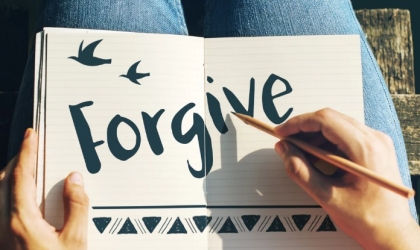The Power of Forgiveness: Unlocking Inner Peace and Growth
In a world full of challenges, misunderstandings, and conflicts, forgiveness often stands as one of the most powerful tools for personal transformation and emotional well-being. Yet, it remains one of the most misunderstood and underutilised virtues. Forgiveness is not about condoning wrongdoings or forgetting the past; it's about releasing the emotional burden that hinders our growth and happiness. This blog post explores the essence of forgiveness, its benefits, and practical steps to cultivate it in our lives.
Understanding Forgiveness
Forgiveness is the conscious, deliberate decision to release feelings of resentment or vengeance toward a person or group who has harmed you, regardless of whether they deserve your forgiveness. It doesn't mean erasing the memory of the offense or excusing the behaviour, but rather, it means freeing yourself from the grip of anger and bitterness.
Common Misconceptions
1. Forgiveness Equals Forgetting
Many believe that forgiving someone means forgetting the offense. However, true forgiveness involves acknowledging the hurt and choosing to let go of the negative emotions associated with it.
2. Forgiveness is a Sign of Weakness
On the contrary, forgiveness requires immense strength and courage. It takes a strong person to face their pain and decide to move past it. This shows you are prepared to confront your own vulnerability, and there is great strength in vulnerability.
3. Forgiveness Requires Reconciliation
While forgiveness can pave the way for reconciliation, it doesn't necessarily mean you have to restore the relationship. Forgiveness is an internal process and can occur independently of the other person.
The Benefits of Forgiveness
Forgiveness has profound benefits for our mental, emotional, and physical health:
1. Improved Mental Health
Holding onto grudges and anger can lead to stress, anxiety, and depression. Forgiving can reduce these negative emotions and improve overall mental well-being.
2. Enhanced Relationships
When we forgive, we open ourselves to healthier relationships. Letting go of past hurts allows us to connect more deeply with others, mend broken trust, and foster an environment of trust and empathy.
3. Better Physical Health
Chronic anger and resentment can contribute to physical ailments such as high blood pressure, heart disease, and weakened immune function. Forgiveness promotes better physical health by reducing stress and its harmful effects on the body.
4. Personal Growth
Forgiveness is a journey of personal growth and self-discovery. It helps us develop empathy, compassion, and resilience, making us better equipped to handle future challenges.
Steps to Cultivate Forgiveness
Forgiveness is a process that takes time and effort. Here are practical steps to help you cultivate forgiveness:
1. Acknowledge Your Pain
The first step in forgiving is to acknowledge the hurt and pain caused by the offense. Denying or minimising your feelings will only prolong the healing process. Allow yourself to feel the emotions and understand the impact of the event.
2. Reflect on the Situation
Take some time to reflect on the situation objectively. Consider the circumstances and the intentions of the person who hurt you. This doesn't mean justifying their actions, but gaining a broader perspective can sometimes ease the intensity of your emotions.
3. Empathise with the Offender
Try to see the situation from the other person's perspective. Have they expressed a sincere apology? Irresepective of whether they have or haven’t, this doesn't excuse their behaviour, but stepping into their shoes for a moment may help you understand their motivations and struggles. Empathy can be a powerful tool in the forgiveness process.
4. Decide to Forgive
Forgiveness is a conscious choice. Make the decision to forgive, understanding that it is for your benefit. This decision might need to be reaffirmed repeatedly as you work through your emotions.
5. Let Go of Resentment
Release the grip of resentment and bitterness. This might involve expressing your feelings through writing or talking to a trusted friend or therapist. Letting go is crucial for moving forward.
6. Focus on the Present
Dwelling on past hurts keeps you stuck in a negative cycle. Focus on the present and what you can do now to improve your well-being. Mindfulness and meditation can be helpful practices in staying grounded.
7. Seek Support
Forgiveness can be a difficult journey to undertake alone. Seek support from friends, family, or a professional therapist. Sharing your experiences and emotions with others can provide comfort and guidance.
8. Practice Self-Compassion
Be kind to yourself throughout the forgiveness process. Recognise that healing takes time and that it's okay to have setbacks. Treat yourself with the same compassion and understanding you would offer to a friend.
Forgiveness in Different Contexts
Forgiveness can be applied in various aspects of life, each with its unique challenges:
1. Forgiving Others
This is the most common form of forgiveness and involves letting go of resentment towards those who have hurt us. It's a crucial step in healing and moving forward.
2. Forgiving Yourself
Sometimes, we are our own harshest critics. Forgiving yourself for past mistakes and shortcomings is essential for personal growth and self-acceptance. Recognise that everyone makes mistakes and that they are opportunities for learning and improvement.
3. Forgiving Situations
Life can present us with unfair and painful situations. Forgiving these situations doesn't mean accepting them passively but rather releasing the negative emotions associated with them. This allows us to focus on what we can control and make the best out of our circumstances.
Conclusion
Forgiveness is a powerful and transformative practice that can significantly enhance our emotional and physical well-being. It requires courage, empathy, and self-compassion, but the rewards are immense. By letting go of resentment and embracing forgiveness, we open ourselves to inner peace, healthier relationships, and personal growth.
Remember, forgiveness is a journey, not a destination. It's a process that unfolds over time, requiring patience and persistence. As you embark on this journey, be gentle with yourself and acknowledge the progress you make along the way. Forgiveness is not just a gift to others; it's a profound gift to yourself, allowing you to live a more fulfilling and joyful life.



















